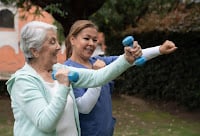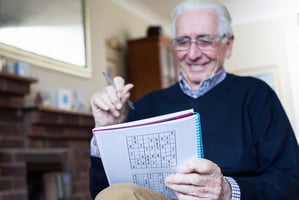Combination Physical, Cognitive Rehab May Be Most Helpful for Cognitive Impairment

Interventions that include physical and cognitive training in a single protocol are the most effective nonpharmacological therapy for older people with cognitive impairment, a meta-analysis in the American Journal of Geriatric Psychiatry has found.
Luis Carlos Venegas-Sanabria, Ph.D., of the Universidad de Castilla-La Mancha in Spain and colleagues analyzed data from 121 studies with a combined 9,361 participants. Overall, 53.7% of the studies included only participants with mild cognitive impairment (MCI), 39.7% included only patients with dementia, and 6.6% included a mixed population. The mean age of study participants was 74.6 years.
The nonpharmacological interventions assessed were aerobic exercise, strength exercise, multicomponent physical exercise, other physical exercises, tai chi, other mind-body exercises, traditional cognitive rehabilitation, computer-based cognitive rehabilitation, occupational therapy, music therapy, physical-cognitive rehabilitation, and reminiscence therapy. The most frequent intervention was conventional cognitive training, followed by aerobic exercise, multicomponent physical exercise, computerized cognitive training, and physical-cognitive exercise.
Among individuals with any cognitive impairment (dementia or MCI), physical-cognitive exercise was the most effective nonpharmacological intervention for improving cognition, followed by computerized cognitive training in a distant second. Regular cognitive intervention and multicomponent physical exercise also showed positive, albeit minor, effects. Physical-cognitive exercise was also the most effective intervention for individuals diagnosed with dementia, followed again by computerized cognitive training.
For people with MCI, however, occupational therapy was the most effective intervention, followed by multicomponent physical exercise and physical-cognitive exercise. In this case, the difference between the interventions was less profound. The researchers noted that the occupational therapy performed in the studies they assessed was a dual-task intervention that targeted both motor skills and cognitive functioning.
Venegas-Sanabria and colleagues noted that physical exercise has been reported to change the hippocampal volume in healthy human brains, improve learning ability, and modulate inflammation associated with cognitive decline. They added that cognitive training has been shown to affect neuroplasticity and neural networks in aging and neurodegenerative disease.
“The combination of these interventions seems to enhance their effects, and cognitive training could increase the number of surviving new neurons generated in response to physical exercise,” the researchers wrote. “Additionally, the combination of physical and cognitive training could cooperate to induce neuroplasticity and increase neurogenesis and synaptogenesis.”
For related information, see the Journal of Neuropsychiatry and Clinical Neurosciences article, “Mid- and Late-Life Physical Activity and Neuropsychiatric Symptoms in Dementia-Free Older Adults: Mayo Clinic Study of Aging.”
(Image: Getty Images/iStock/Hispanolistic)
Don't miss out! To learn about newly posted articles in Psychiatric News, please sign up here.





